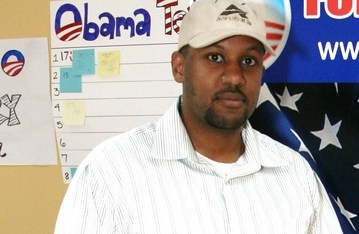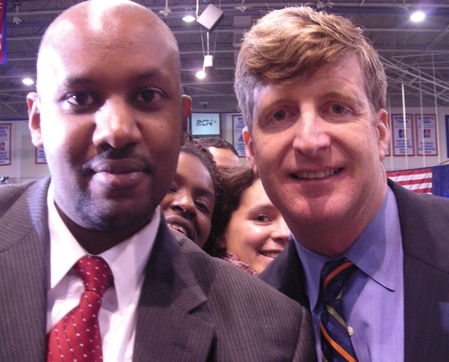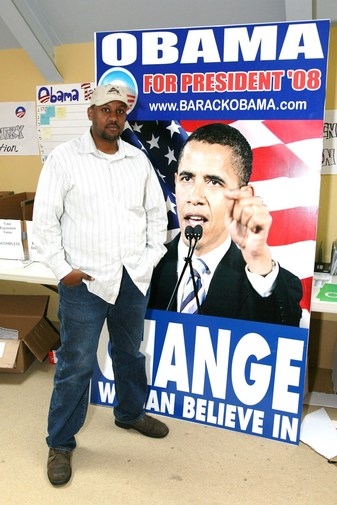
Unity Starts with Honesty, Honesty Starts with Me (Opinion)
By Teddy Fikre
Published: Wednesday, March 26, 2008
New York (Tadias) – Watching Barack Obama’s historic speech about race and it’s omnipresence in the lives of all Americans had a profound impact on me. I was inspired by his honesty and his blunt assessment of our collective and individual deeds that perpetuates the divides within communities all across this nation and throughout the world. It was this powerful moment that led me to some introspection into my actions and how I perpetuate the intangible, yet real, walls that separates neighbor from neighbor, co-worker from co-worker–and in some instances–friend from friend.
I was born in Ethiopia and immigrated to America at the age of seven. Though I always kept my Ethiopian identity, I also grew up as an American. The experiences that construct my life narrative are those of being an Ethiopian who grew up in the United States from an African-American perspective. This duality of roles has given me the ability to view the gap that divides the African Diaspora by straddling that very chasm. I am a member of a proud black Fraternity–Omega Psi Phi. Yet the memories of Addis Ababa –memories of my neighborhood, school, and my grandmother in Ethiopia –keep me tethered to my Ethiopian identity. Sometimes I feel blessed because I have a connection to many cultures; at other times, I feel as though I walk an invisible line–vacillating between my Ethiopian culture and my African-American culture.

Above: Congressman Patrick J. Kennedy of Rhode Island (right) posed for a
photo with Teddy Fikre during a rally at American University in Washington,
DC, on January 28th, 2008.
It is this binary life–this distinction between two “cultures”–that challenges the notion that I have transcended the divide between the African-American culture and my Ethiopian culture. I often get asked by my African-American friends why it that Ethiopians don’t embrace non-Ethiopians. At the same time, I see in the African-American community a hesitation to fully accept Ethiopians and those that have emigrated from Africa . If we are honest with ourselves, the divides between Africans and African-Americans are real. There are those few in both cultures who either view African-Americans as deserving of their plight or view Ethiopians–and Africans as a whole–as free-loaders who benefit in America at the cost of African-Americans. There are those on both sides who denigrate and deride others simply because they were not born in the right country or are not of the same ethnicity.
The racial divide that Barack Obama spoke about is not constrained by the quarters of black and white Americans; it is an undercurrent that exists within people of the same color and, in some cases, of the same country. It reaches out beyond black and white, extending the reaches of division on the microscopic basis of dark and light, African and African-American. Moreover, this very virus of division infects countries in every corner of the world. The division between Serbs and Croats, Hutus and Tutsis, Aborigines and Aussies, Puerto Ricans and Mexicans, Pakistani and Indian to name a few reveals a world where communities who have similarities are often rife with soft-apartheid on the basis of ethnicity, complexion, or religion.
I assumed that my experience walking the line between my Ethiopian and African-American identities had cauterized this discordant mindset. I figured that I was enlightened, that I transcended the ethnic divides simply because I have many friends of many cultures–Ethiopians, African-Americans, whites, Latino, Asian and those from countries from every continent. However, this weekend, I planned a trip to Pennsylvania to galvanize the Ethiopian community and to volunteer for the Barack Obama campaign. I reached out to the Ethiopian community to make the trip up to Philadelphia to register voters. Concurrently, I reached out to my fraternity brothers to volunteer and do additional work once the outreach to the Ethiopian community was accomplished.
While I did not realize it at the time, my honest effort to galvanize voters to register perpetuated–subconsciously–the very divides which I thought I transcended. Why is it that I segregated the two efforts? Why is it that I sent out one email to the Ethiopian supporters while sending out another email to my fraternity brothers? At the time, my aim was to have the most impact by focusing varying constituencies to various efforts. I failed to see that my well-intentioned plans served to further the very divide which I sought to narrow. This contradiction did not crystallize until I arrived in Philadelphia and entered the beautiful Ethiopian church of Kidus Ammanuel (St. Emmanuel). I listened to the moving words of Abba Danachew and felt connected to the congregation that welcomed me into their church as one of their own. However, the most moving part of my experience occurred after the sermon, when one of the church elders stood up to congratulate a Jamaican couple who baptized their child in that very church. He went on to tell them that he was brimming with pride that they chose Kidus Ammanuel as their church and that they are a part of a family that will always welcome them–a church that will always be there for them. The congregation clapped effusively; I paused to ponder my own failings.
It was at that moment that my fraternity brother called me, and I told him to come meet me in the church to help me register voters. Instantly, I realized that I, at times, stand just as guilty of the myopic thinking that I repudiate. To one degree or another, we are all guilty of the practices that keep us divided; the very victims of discrimination can often be the perpetrators of it. The hatred that has taken centuries to fester claims as victims those who preach it and those who are its target. Discrimination does not reside in the narrow confines black and white, it permeates all societies–the impacts of which are felt trans-racially and trans-ethnically.
I love my Ethiopian heritage, I love my African-American experience, and I love my American journey; however, my own journey towards true inclusion and unity is far from achieved. That is the power of Barack Obama’s message, that in our own ways we all have our failings which contribute to the divides that exists between our communities. Nonetheless, these failings do not define us–we are not static–and we can grow beyond the walls that have defined our experiences to attain the true meaning of unity; to achieve the essence of E Pluribus Unum–out of many one.
—-
About the Author: Teddy Fikre is a business consultant. He resides in Virgina. Teddy was born in Addis Abeba, Ethiopia, and immigrated to America at the age of 7. He is a volunteer and a member of Ethiopian Americans for Barack Obama. Teddy believes that Barack Obama is the one candidate who can move us past the political rancor of the past 20 years and deliver a broad and diverse coalition that can tackle the tough issues that face all Americans in the 21st century. (The photo below shows Teddy Fikre at the Barack Obama Headquarters in Philadelphia, Pennsylvania, on March 15th, 2008).



























Well said. I have an Ethiopian friend who always makes a point of inviting me to her church. It is rather far and I do not speak Amharic or Geez but I really appreciate her reaching out to me. Ironically, we often seek to reach out to each other but seldom meet, I guess the key is to continue the goodwill and dialogue.
Well written. “I am Omega” and my wife is Ethiopian. We’re a dynamic duo! We reside in Anacostia. I’ve learned so much about the Ethiopian culture. She’s learned so much about the (Afro) American culture.
FA93
Alpha Omega
Les Johnson
Wonderful! We find ourselves now looking inward and changing the way we see things, changing the way that we relate to people and changing who we are. Though I am not Ethiopian, I collect Ethiopian Christian art and give it to people as a way of sharing something of my passion and myself. However, I find myself picking the people I share it with, almost as if I’m annointing a chosen few…knowing who’ll “get it” and who won’t. I realize how stingy I’m being in my giving, thinking, sharing, and loving. All blessings to you!
As a young man I had an occasion to live with African Americans. i am white, now 56 yrs. old.
In my younger years I inherited a bigotry that was handed down by my family, but then I experienced first hand the rediculousness of that way of thinking.
I have a wonderful friend who is Ethiopian , and she sent me this article.
I see the differences of say, Chicago raised black people and foriegn born.
I sincerely PRAY that someday we ALL can get beyond these frivulous ideologies that keep us apart.
I would suggest this article to everyone interested in this blog:
http://tadias.wordpress.com/2007/02/07/ethiopian-african-american-relationsthe-case-of-melaku-e-bayen-and-john-robinson/